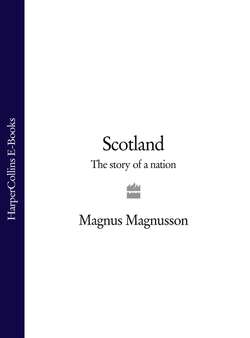Читать книгу Scotland: The Story of a Nation - Magnus Magnusson - Страница 23
The Britons
ОглавлениеTo the west of the Lowlands there was another realm – or rather, another shifting conglomeration of petty kingdoms and principalities – which took in a huge stretch of land from the Clyde down through today’s Dumfries and Galloway, over Hadrian’s Wall and across the Solway as far south as the present Lake District. This was the kingdom of the Britons – basically, Cumbria; but, as with Northumbria, we must not confuse its boundaries with those of today’s Cumbria. The original Cumbria was the Latinised ancient name for this territory of the Britons, derived from a variant of the same word as modern Welsh Cymry, the name of the peoples there. In the sixth century this Brittonic realm may well have been the home ground of Arthur (Arturus), a Romanised British war-leader who was promoted, in legend, into a great European champion of Christianity, the ‘once and future king’ of the Britons.
Within this British realm of Cumbria two separate kingdoms emerged north of Hadrian’s crumbling wall. One was Strathclyde, whose boundaries stretched as far south as Penrith. Its power-centre was at the basalt Rock of Clyde (Altcluith, Dumbarton Rock), where Dumbarton Castle now stands. Its ‘spiritual’ centre seems to have been in the Govan area, somewhere near Govan Old Parish Church; this church now houses an impressive collection of thirty-one pieces of sculpted stonework dating from the ninth to the eleventh centuries, including a magnificently carved giant sarcophagus.
The British of Strathclyde reached the height of their power in the seventh century; Strathclyde survived as a client kingdom of Alba until the Battle of Carham in 1018 (see below), where the last native king of Strathclyde, Owain the Bald, was killed.
The other British kingdom was Rheged, based on Carlisle and covering Galloway in the extreme south-west of Scotland. Rheged is the most shadowy of all the kingdoms of the ‘Dark Ages’. One name stands out from ancient Welsh poetry: that of Urien, king of Rheged, whose exploits were hymned by the Welsh bard Taliesin. In 590 he took part in a siege of the Anglian stronghold on the island of Lindisfarne, off the north-east coast of England, but was assassinated by a rival British king who was jealous of his prowess.
